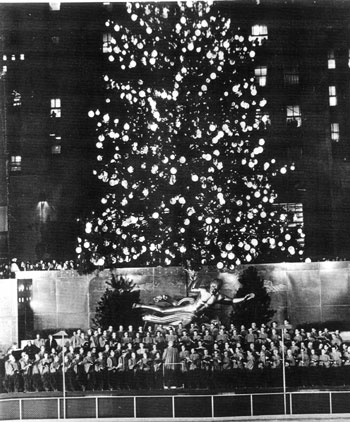By Jaclyn Marinese
Members come from all walks of New York’s professional worlds from acting to nursing. Largely due to Dr. George Mead, the club’s first accompanist and conductor for 50 years, the club enjoyed a strong history and relationship with Downtown residents and business people.
Despite its rich past, the group has struggled to keep membership consistent in recent years.
“There was a time when we didn’t know if the club was going to survive,” said Gerald Osterberg, its current president.
After reaching a height of 250 members in George Mead’s day, by 1996 membership dropped to 12. It has made a modest resurgence recently.
Hard times aside, their music still echoes every week through the parish hall of the Trinity Church, the group’s current rehearsal space.
In its earliest days, rehearsals took place at downtown locations like Saint Paul’s Parish on Vesey Street, Robbin’s Restaurant on Broad Street and Plantar’s restaurant on Pearl Street. Early performances were at venues including Carnegie Hall, the Roosevelt Hotel, and a special performance for President Hoover at the White House. It performed at fundraisers, war bond drives, graduations, and the Rockefeller Center Tree lighting.
“The Down Town Glee Club was formed at a time in New York City and American history for that matter, when choral singing was a natural outlet for the native musical skills that many people had,” said Osterberg. “It was before movies, TV, and radio when people pretty much entertained themselves.”
Other than changes in American society, there have been other reasons for the membership fluctuation. Club members were often businessmen from downtown Manhattan, working for companies that helped secure funding for the glee club. Today many members are retired or commute into Manhattan to rehearse. In the early days, people such as J.P.Morgan, a non-singing associate member, and Allan Wardwell, one of the founders of the Wall Street law firm Davis, Polk and Wardwell, were among its members.
The club has also received some opposition from those condemning the notion of a male-only group. Members claim that it’s been a challenge to explain the two tenor and two bass format of music, as opposed to a soprano, alto, tenor, base, format of a mixed-sex group, to those that don’t know the tradition.
“We’re not just a boys club,” said Stephen Vrattos, chair of the club’s music committee. “There’s actual four part men’s singing. There’s a sound, there’s a timber to it, and a way it’s arranged that takes advantage of the men’s voice.”
Currently the Down Town Glee Club performs two concerts a year at St. Peters Church in midtown. Unfortunately, the $75 yearly membership dues and ticket sales are hardly offsetting the group’s expenses, including the professional conductor and accompanist, music, concert hall rentals and general administrative costs. Despite financial hardships, the club always manages to do some pro bono performances like their yearly visit to St. Margaret’s House, a senior facility on Fulton Street, or the recent charity concert at St. Paul’s Chapel. In December of 2001, the group performed on the Intrepid for the 60th anniversary of Pearl Harbor; their first performance since 9/11.
Because of a core group of dedicated members, this link to downtown history is still a present-day part of the area’s cultural identity. The secret to staying together for all these years, members say, is to approach each rehearsal and performance with a sense of humor.
“We want to smash the notion of a glee club,” said Vrattos. “I mean, yes, we’re wearing tuxedos, but it’s fun. We’ll do the odd classic glee-club number like ‘Stout-Hearted Men,’ but then we’ll do a Beatles medley, like what we’re going to be doing this year.”
“We will probably never appear at Carnegie Hall again, the New York Times will not write a review, and our concert tickets are not going to be hot items,” said Osterberg, who adds that, in contrast to a lot of other male choirs in the New York City area, the Down Town Glee Club is a place that does not specialize because of profession, religion or any other affiliation.
The group is willing to accept singers of all levels, people from all sectors of New York life and they strive to maintain a non-pretentious and friendly social atmosphere for members. “This is not something people do to network,” he adds.
“They are here because they love to sing, and that’s it.”
Reader Services

































